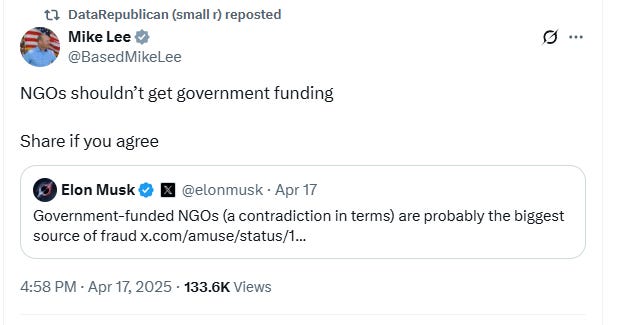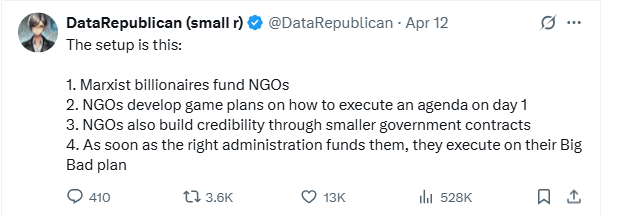One oddity about the recent political environment is the flaming hostility to so-called NGOs, or non-governmental organizations.
If you’re like me, you might be wondering, “what are NGOs, anyway?” I spent nearly a decade in philanthropy, and I still didn’t exactly know why anyone ever came up with the term “non-governmental organization,” until looking it up just now.
The term apparently traces back to Article 71 of the United Nations Charter from the 1940s: “The Economic and Social Council may make suitable arrangements for consultation with non-governmental organizations which are concerned with matters within its competence.”
But I still am not sure why the UN used that term. Doesn’t “non-governmental” describe almost everything in the world, including churches and synagogues, McDonald’s and Walmart, and everything else that isn’t “governmental”?
Turns out that “NGO” has a very particular meaning in most cases. It means something like this: “non-profits that pursue humanitarian or social goals in line with what the government itself wants to pursue, often or usually with governmental support.”
Indeed, one might say that NGOs are often doing the work that government wants to do, or even promised to do (whether food banks, homeless assistance, foster care, or blood donations), but then decided to outsource.
For some reason, though, some folks are currently quite agitated about the entire category of NGOs. For example, here we have an United States Senator saying that NGOs should get no government funding at all, and quote-tweeting Elon Musk saying that government-funded NGOs are “probably the biggest source of fraud.”
[Needless to say, this claim of Elon’s is exactly like his other claims of fraud to date, with no actual evidence of any wrongdoing.]
If you go one step deeper to look at who Elon repeatedly retweets, it’s someone who has even more conspiratorial and baseless views about the world:
Alright then.
As an initial matter, opposing any and all NGOs is the intellectual equivalent of “Occupy Wall Street” leftists who hate all corporations. The categories “corporation” and “NGO” are simply far too broad and varied for any sensible person to have one opinion about them all.
Some corporations do engage in wrongdoing of various sorts (e.g., committing financial fraud or pouring dangerous chemicals into the environment), but most corporations are basically producing useful goods and services for the marketplace.
Same goes for NGOs: some might engage in wrongdoing (such as self-dealing, or just not doing anything useful in the world), but most NGOs are at least trying to do good work.
The biggest and most quintessential example of an NGO is the Red Cross. It’s an international non-profit organization that does receive some public funding (but mostly private funding), and that is focused on issues like disaster relief or blood donation (all of which are in the public interest).
Do some folks now think that the Red Cross is a Marxist fraud, and should never get public funding for anything it does? Why? Any reason beyond information-free conspiracy theories?
Another well-known NGO: World Vision, a “Christian humanitarian NGO focused on issues like poverty, education, child protection, disaster relief, economic empowerment, and clean water. … In 2022, World Vision helped 3.2 million kids through child sponsorship; assisted 31.1 million refugees and disaster survivors; and gave 3 million people clean water access.”
Do folks think that World Vision is a fraud, and should never get public funding for anything it does? Why?
***
To be sure, there are some cases where NGOs have a vested interest in not really solving a social problem (because their own reason for existence would then disappear). As well, there are far too many examples of NGOs that funnel too much money to themselves (e.g., this San Francisco non-profit that managed a bunch of city-funded housing units, but apparently overpaid staff and gave large bonuses even when short on cash, or this housing non-profit that not only mis-spent its money, but actually lobbied against affordable housing measures).
This is why it’s useful to have transparency and oversight!
But it isn’t a reason to oppose NGOs altogether, any more than the fact that Accenture spent way too many millions on a failed government software project is a reason to abolish all corporations.
After all, corporations have just as much of an incentive to engage in rent-seeking as NGOs, especially when dealing with the government.
An organization’s choice about how to be taxed under US tax law has next-to-zero effect on the incentives that the organization will face as to rent-seeking, padding bills, etc. If we find an occasion where the incentives malfunctioned and someone cheated the government out of $__ million dollars, that is simply not a reason to take out our vengeance on, of all things, the corporate structure chosen under US tax law. The corporate structure will almost certainly not be the causal factor in why the government lost money.
***
The angst that Elon Musk feels about NGOs seems to be driven by nothing more than this: The people who work at a lot of NGOs tend to vote for Democrats.
No kidding, Sherlock. People who decide to work for homeless shelters, food banks, malaria prevention efforts in Ethiopia, high-school dropout programs, etc., probably do vote more “liberal” than folks who choose to become police officers or investment bankers.
So what?
If the question is “when and how do NGOs do good work,” we don’t need to ask whether their staff votes for Democrats. By the same token, if I want to know whether the F-35 is a well-performing investment for the Air Force, I shouldn’t bother myself with whether Lockheed’s staff vote for Republicans.
Instead, the questions in both cases include:
How best to measure good work in the first place (that’s often quite hard!);
How to incentivize good work; and,
How to get a fair price that does allow for occasional cost overruns (which can legitimately occur) without rewarding them.
These are perennial questions for government work (and corporate work as well). And these should be the questions on our minds when we talk about NGOs. Not conspiracy theories.





It turns out NGO's are deeply unpopular with self-described 'leftists' as much as any critics on the right-
https://jacobin.com/2025/02/western-ngos-funding-civil-society
'Western-Backed NGOs: A Hollow Version of Civil Society'/ Almut Rochowanski
"After World War II, in parallel to decolonization, NGOs — tellingly, “nongovernmental organizations” — rose slowly but unstoppably to become one of the main players in international development aid, because donor countries did not trust the (Third World) state with social and economic agendas. Initially, this attitude came from a place of earnest people-to-people solidarity, but it soon developed explicitly neoliberal side effects. And since it was the Cold War, NGOs operating in developing countries were routinely co-opted by Western security services. This did long-term damage to the reputation of NGOs around the world, in almost all cases unjustly...
Western legislative traditions going back to the nineteenth century reflected the classic civil right of freedom of association and thus provided a regulatory framework for associations in the literal sense: people coming together as members of a club or union, taking action primarily through members’ volunteer activities to benefit each other or the common good, funded by default by membership fees. The NGOs that Western governments finance with their development aid budgets look nothing like this, but more like start-ups run by social entrepreneurs. Instead of members and volunteers, they have bosses and employees organized in strict hierarchies, and hard borders separate those who build lucrative careers managing NGOs from those who benefit from their assistance...
The NGO sector as it currently exists in the Global South and the EU’s periphery — almost entirely foreign-funded, simultaneously bloated and deficient — belongs to the global order of the post–Cold War unipolar moment. That global order is now cracking at the seams. NGOs are no Siberian tigers, worthy of conservation for their own sake. Having realized that, we should not frantically shore up vested interests, but earnestly try to let better, more sustainable, and locally anchored forms of civil society take shape."
******
To be clear, I don't agree with this gloss. Apparently establishing 'left-wing' credibility means saying liberals and their NGO's are not just bad, but at least as bad as- or worse than- fascists. Seems odd to me.
Let's use this forum for non-political discussions. Those can be discussed in a thousand other places. Let's discuss science here. Science.